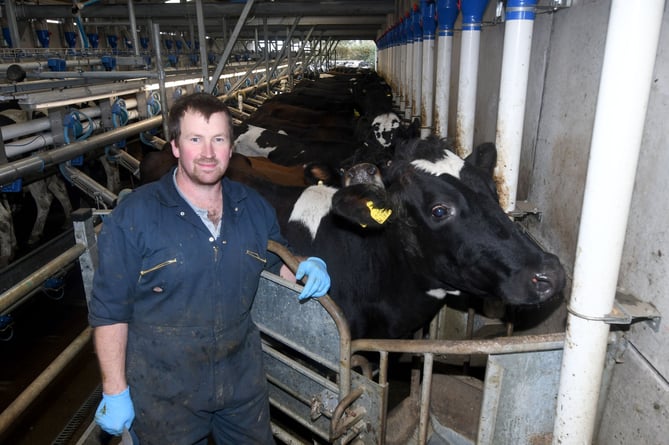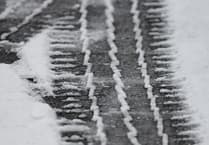David Cooil was the Large Farm and Overall winner at the recent Chough Awards.
The awards are organised by the Isle of Man Farming and Wildlife Advisory Group (FWAG) which encourages the support of wildlife alongside commercial agriculture and David’s farming methods reflect this.
He and his brother, Rob, run two farms – one in Port St Mary and one in Ballabeg. They milk around 220 cows, have more than 400 head of young stock and fatten around 120 beef cattle a year.
Ballagawne Farm, just outside Ballabeg, where David lives and where all the milking is done, was entered into the awards.
When you ask him why he thinks he was chosen for the award, David says: ‘We had a good visit with the judges when they came round this farm. I think they liked the fact that we’ve got a productive, profitable farm and we make room for nature in among it.
‘We’ve got big hedgerows that are managed on a two or three year cycle so there’s loads of birds and insects around. We rotationally graze the grass so there’s always different lengths of grass, which gives different habitats all the time, throughout the year. They’re moved from paddock to paddock and grazed on a peak 21-day rotation so the grass is left to recover.
‘There’s always a field somewhere with enough cover for each type of species of bird and the amount of grass they like.
‘We’ve got a wildlife corridor down through the middle that links up two of our meadows.’
The recently introduced Agri Environment Scheme is intended to incentivise farmers to put more of a focus on wildlife and the environment but David, like most farmers, will tell you that this is nothing new on his farm.
‘All this is stuff that we’ve been doing for 20 years. It’s not stuff that we’ve been doing because of the AES scheme.’
David has, though, taken advantage of the information and support now available from the AES delivery partner, Manx Wildlife Trust.
David says: ‘It was David Bellamy, from the trust, that pushed me to put our name forward for the award. He’d been round here twice because I’d wanted advice, because we’re farmers, we’re not naturalists.
‘All this has just sort of happened alongside the farming, it’s kind of accidental in some ways.’
David has long been known for his willingness to learn new ways to make his farm more efficient and productive and there have been two ‘lightbulb moments’ for him this year. The first was when he discovered dung beetles in his fields.
He says: ‘I started to notice that the cow pats were disappearing so I had a root into them and found dung beetles.’
And the more he found out about these little creatures, the more enthusiastic he became.
He says: ‘They’ve just got a lot of benefits. One of those benefits is breaking that dung down, getting it down into the soil, increasing organic matter and soil carbon which is holding on to water, allowing it to be more resilient against drought. We’re reducing our fertilisers because, hopefully, the dung beetles are making the nutrients more available for the plants.
‘If they’re doing the job for you it’s one less thing you have to do isn’t it?’ In addition, dung beetles also reduce nuisance fly populations by transporting phoretic mites that eat fly eggs and help control intestinal parasites by reducing dung suitability for worm larvae.
This has led to David also reducing the amount of fly and worm control he uses on his stock.
Farmers and horse owners have traditionally had their animals on seasonal working programmes but recently worm resistance has become a hot topic, especially when stock are underwormed, which happens when the animal’s weight is incorrectly estimated and not enough dewormer is used.
David’s second breakthrough this year was the decision to move to ‘10 in seven’ milking, something else the Chough Award judges noted approvingly.
He says: ‘We started in mid-July. A member of staff left to go to New Zealand and instead of replacing him, to try to keep costs down, we decided we’d try 10 in seven. We’d read about it a lot.
‘We started milking 10 times a week so we dropped four milkings off the week. We were milking once a day on a Saturday, Sunday, Tuesday and a Thursday so that we had additional time to spend with the kids over the school summer holidays.
‘Sir John Lorimer, The Lieutenant Governor who was one of the judges, commented that he liked the fact that we make the farm more work around our kids so we can each have time off to spend with our families.’
But what was the effect on the cows?
David says: ‘The first week the yield of the cows dropped and they were really unsettled and then the yield steadily climbed back to exactly where it was. So we were getting the same amount of litres, we were using 25 to 28% less electric, we dropped a labour unit which is a significant saving, and the fats and proteins of the milk had increased.
‘And the condition on the cows was mega. They were really looking good and they weren’t uncomfortable because they were off peak.
‘I don’t think you’d get away with that on an all-year-round calving but we’re a spring and autumn block calving so we dried off the autumn calvers and we only had cows that were well over the peak of their milk.’
‘They’re just creatures of habit. If you’re half an hour late going to get them in, they’re unsettled. So it just took them a week to resettle into a new routine and then once they settled they were fine.’
You will have spotted that none of the eco-measures on David’s farm have involved him in a large capital outlay and several have actually saved him money. He does however have some tree planting planned.
He says: ‘We’re going to plant some trees over this winter, some walnut trees, which give off a pheromone which is a natural fly repellent. We’re going to try and plant some of them round the milking parlour and water troughs, high density areas.
‘I’m also going to plant grazeable trees that eventually, once they’re strong enough, we’ll be able to let the cows browse them for extra feed and extra minerals and nutrients.
‘They’ll eat the leaves and apparently they’ll eat the twigs on them as well. This will be the first capital thing that I’ve put into on the Agri Environment Scheme.’
And when you ask David how he feels about receiving this award, he says: ‘It’s nice to get recognition for years of work, isn’t it?
‘I think all farmers on the Isle of Man need recognition for the work they do. Without farmers the countryside wouldn’t look like it looks, would it?’




